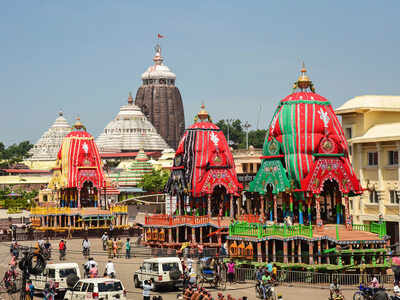Top Searches
- News
- India News
- Supreme Court agrees to allow Rath Yatra in very restricted manner
Supreme Court agrees to allow Rath Yatra in very restricted manner

NEW DELHI: The Supreme Court on Monday agreed to allow the annual Rath Yatra in Puri from Tuesday in a very "restricted manner" in the wake of the Covid-19 pandemic.
The apex court, which had earlier stayed this year's Rath Yatra, said it will leave it to the Jagannath Temple Management Trust and Odisha government to conduct the festival in a very restricted manner without allowing devotee congregation.
The state said it will coordinate with the Centre to hold the Rath Yatra.
Earlier in the day, the Centre told the apex court that Rath Yatra in Puri can be allowed without public participation in view of the coronavirus pandemic and said the "tradition of centuries may not be stopped".
The Odisha government also supported the Centre's stand in the apex court.
"It is a matter of faith for crores. If Lord Jagannath will not come out tomorrow, he cannot come out for 12 years as per traditions," said Solicitor General Tushar Mehta, who mentioned the matter before a bench headed by Justice Arun Mishra.
Mehta said that besides maintaining precautions, the state government can impose curfew for a day.
"All 'sebayats' and 'pandas' who have tested negative (for COVID-19) can participate in rituals as may be decided by HH Shri Shankaracharya. People may not congregate and seek blessings on TV during live telecast. Raja of Puri and the temple committee may supervise arrangements of these rituals," Mehta told the bench.
The Puri Rath Yatra, which is attended by lakhs of people from across the world, is scheduled from June 23 and is held over 10-12 days.
The apex court had on June 18 said that in the interest of public health and safety of citizens, this year's Puri Rath Yatra cannot be allowed and that "Lord Jagannath won't forgive us if we allow" it.
A day after the order was passed, some applications were filed in the top court seeking recall and modification of its order.
(With inputs from agencies)
The apex court, which had earlier stayed this year's Rath Yatra, said it will leave it to the Jagannath Temple Management Trust and Odisha government to conduct the festival in a very restricted manner without allowing devotee congregation.
The state said it will coordinate with the Centre to hold the Rath Yatra.
Earlier in the day, the Centre told the apex court that Rath Yatra in Puri can be allowed without public participation in view of the coronavirus pandemic and said the "tradition of centuries may not be stopped".
The Odisha government also supported the Centre's stand in the apex court.
"It is a matter of faith for crores. If Lord Jagannath will not come out tomorrow, he cannot come out for 12 years as per traditions," said Solicitor General Tushar Mehta, who mentioned the matter before a bench headed by Justice Arun Mishra.
Mehta said that besides maintaining precautions, the state government can impose curfew for a day.
"All 'sebayats' and 'pandas' who have tested negative (for COVID-19) can participate in rituals as may be decided by HH Shri Shankaracharya. People may not congregate and seek blessings on TV during live telecast. Raja of Puri and the temple committee may supervise arrangements of these rituals," Mehta told the bench.
The Puri Rath Yatra, which is attended by lakhs of people from across the world, is scheduled from June 23 and is held over 10-12 days.
The apex court had on June 18 said that in the interest of public health and safety of citizens, this year's Puri Rath Yatra cannot be allowed and that "Lord Jagannath won't forgive us if we allow" it.
A day after the order was passed, some applications were filed in the top court seeking recall and modification of its order.
(With inputs from agencies)
FacebookTwitterLinkedinMail
Start a Conversation
end of article
Trending Topics
Quick Links
Coronavirus in MumbaiCoronavirus in KolkataCoronavirus in HyderabadCoronavirus in DelhiCoronavirus in BangaloreCoronavirus symptomsCoronavirus in IndiaWhat is CoronavirusCoronavirus NewsSolar EclipseNPRWhat is NRCCAB BillCAB and NRCRTI BillPodcast newsLok SabhaShiv SenaYSRCPCongressBJP newsUIDAIIndian ArmyISRO newsSupreme Court